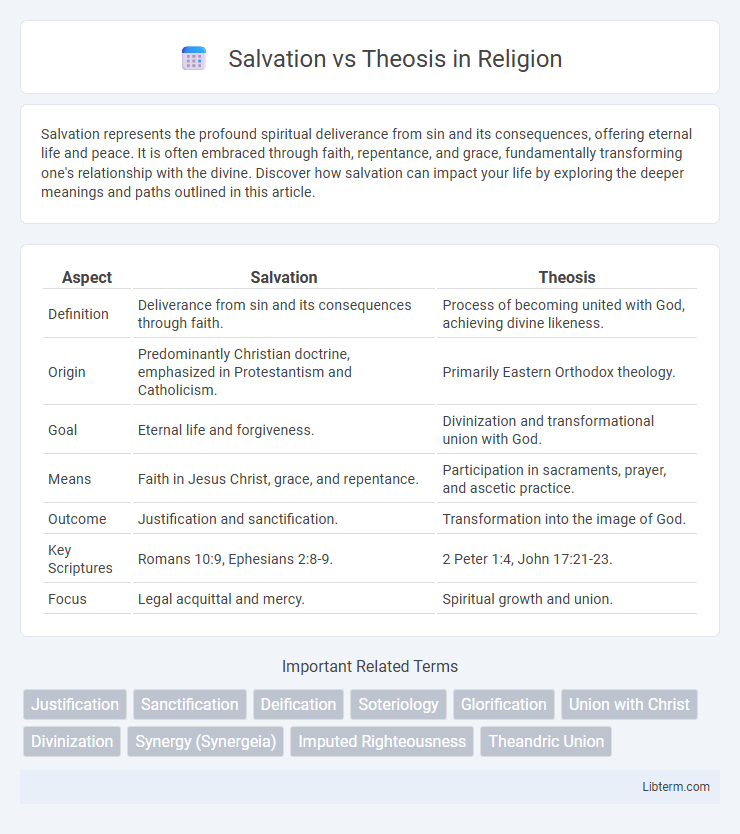Salvation represents the profound spiritual deliverance from sin and its consequences, offering eternal life and peace. It is often embraced through faith, repentance, and grace, fundamentally transforming one's relationship with the divine. Discover how salvation can impact your life by exploring the deeper meanings and paths outlined in this article.
Table of Comparison
| Aspect | Salvation | Theosis |
|---|---|---|
| Definition | Deliverance from sin and its consequences through faith. | Process of becoming united with God, achieving divine likeness. |
| Origin | Predominantly Christian doctrine, emphasized in Protestantism and Catholicism. | Primarily Eastern Orthodox theology. |
| Goal | Eternal life and forgiveness. | Divinization and transformational union with God. |
| Means | Faith in Jesus Christ, grace, and repentance. | Participation in sacraments, prayer, and ascetic practice. |
| Outcome | Justification and sanctification. | Transformation into the image of God. |
| Key Scriptures | Romans 10:9, Ephesians 2:8-9. | 2 Peter 1:4, John 17:21-23. |
| Focus | Legal acquittal and mercy. | Spiritual growth and union. |
Understanding Salvation and Theosis: Key Definitions
Salvation in Christian theology typically refers to the deliverance from sin and its consequences through faith in Jesus Christ, emphasizing forgiveness and eternal life. Theosis, primarily in Eastern Orthodox Christianity, denotes the transformative process of becoming united with God and attaining divine likeness through grace. Understanding these key definitions highlights salvation as a legal reconciliation and theosis as a mystical participation in God's nature.
Historical Roots of Salvation and Theosis in Christianity
Salvation in Christianity has roots in Judaic traditions emphasizing deliverance from sin and eternal life through faith in Jesus Christ. Theosis, primarily developed in Eastern Orthodox theology, traces back to the early Church Fathers like Athanasius, who described salvation as becoming "partakers of the divine nature" (2 Peter 1:4). Both concepts emerged from biblical exegesis but diverged, with salvation focusing on justification and grace, while theosis centers on transformative union with God.
Biblical Foundations: Salvation in Scripture
Salvation in Scripture is primarily depicted as deliverance from sin and reconciliation with God through faith in Jesus Christ, emphasizing justification by grace (Ephesians 2:8-9; Romans 3:23-24). Biblical texts highlight salvation as a past, present, and future reality, marked by repentance, forgiveness, and eternal life (Acts 2:38; 1 John 5:13). Salvation is often portrayed as a legal transaction, where believers are declared righteous before God through Christ's atoning sacrifice (Romans 5:1; 2 Corinthians 5:21).
Biblical Foundations: Theosis in Scripture
Theosis in Scripture is rooted in passages such as 2 Peter 1:4, which speaks of becoming "partakers of the divine nature," highlighting the transformative union with God envisioned in Eastern Orthodox theology. John 17:21 emphasizes the prayer of Jesus for believers to be one with Him and the Father, underpinning the concept of divinization as a relational and mystical participation in God's life. Romans 8:29 also affirms the goal of believers being conformed to the image of God's Son, reinforcing the biblical foundation for theosis as an integral aspect of salvation.
Salvation in Western Christian Thought
Salvation in Western Christian thought primarily centers on the concept of justification by faith, emphasizing the forgiveness of sins through the sacrificial death and resurrection of Jesus Christ. This doctrine underscores the believer's legal standing before God as righteous, secured by grace rather than human merit. The process often culminates in sanctification, which is the ongoing transformation of the believer's character, but the foundational element remains justification as the basis for eternal life.
Theosis in Eastern Orthodox Theology
Theosis in Eastern Orthodox theology refers to the transformative process by which believers become partakers of the divine nature, emphasizing union with God through grace and the indwelling of the Holy Spirit. Unlike Western conceptions of salvation that often focus on legal justification, theosis highlights spiritual growth and sanctification as a life-long journey toward deification. This doctrine is deeply rooted in the teachings of Church Fathers like St. Athanasius and St. Gregory Palamas, asserting that salvation involves becoming God-like in holiness while retaining created human nature.
Comparing Salvation and Theosis: Main Differences
Salvation primarily refers to the deliverance from sin and its consequences through faith in Jesus Christ, emphasizing forgiveness and eternal life. Theosis, a concept central to Eastern Orthodox theology, involves the process of becoming divinely transformed and united with God, achieving likeness to God through grace. While salvation addresses redemption and justification, theosis emphasizes transformative sanctification and deification as the ultimate goal of the Christian life.
Salvation and Theosis: Shared Elements
Salvation and Theosis both emphasize transformation through divine grace, highlighting humanity's restoration to a state of holiness and communion with God. Both concepts involve an ongoing process of spiritual growth, where believers actively participate in becoming more Christ-like or united with the divine nature. Scriptural foundations such as 2 Peter 1:4 underscore the shared goal of believers partaking in the divine nature, bridging the theological connection between Salvation and Theosis.
Practical Implications for Christian Life
Salvation emphasizes forgiveness of sins and reconciliation with God, leading to assurance of eternal life, while Theosis involves a transformative process of becoming like God through union with Him, impacting daily holiness and spiritual growth. Practically, salvation encourages faith and repentance as foundational steps, whereas Theosis demands ongoing participation in sacraments, prayer, and virtuous living to cultivate divine grace. Both perspectives guide Christians toward ethical conduct, community involvement, and deeper spiritual maturity in the pursuit of divine communion.
Salvation, Theosis, and Modern Christian Dialogue
Salvation in Christian theology is traditionally understood as deliverance from sin and its consequences through faith in Jesus Christ, emphasizing redemption and eternal life. Theosis, rooted in Eastern Orthodox Christianity, describes salvation as a transformative process of becoming united with God and sharing in divine nature. Modern Christian dialogue increasingly explores these concepts, seeking common ground between the Western emphasis on legal redemption and the Eastern focus on spiritual union to enrich contemporary faith perspectives.
Salvation Infographic

 libterm.com
libterm.com